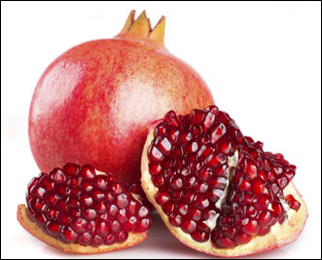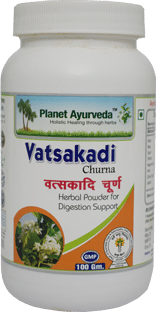Pomegranate (Punica Granatum) – Properties, Benefits & Dosage

Description of Plant
It is extremely long lived small tree or shrub growing up to 6-10mt in height with numerous spiny branches. Leaves are narrow oblong, opposite or sub-opposite, 3-7cm long and 2 cm broad. Bright red colored flowers of this tree are 3 cm in diameter, with 3-7 petals. Edible and delicious fruit of this tree is berry which is intermediate in size between lemon and grapefruit. Fruit is round shaped with thick and reddish covering. Number of seeds varies in each fruit surrounded by watery pulp seed coat with different colors from white to deep red or purple. All the seeds are embedded in spongy, white and astringent membrane.
General Information
Pomegranate is a fruit with many nutritional benefits. Its use as an herbal remedy in anemia is very popular. But it has many such similar health benefits which are lesser known but equally effective.
All parts of this plant are used for medicinal purpose such as the fruit, fruit rind, root and bark etc. The Latin name of this fruit is Punica Granatum and it belongs to Punicaceae family.
It is rich many vitamins like vitamin B – complex and minerals and is great for the heart. Pomegranate juice and seed powder is also used to prepare many food items and desserts, given their delicious flavor. The fruits are bright red in color and bear juicy seeds arranged like teeth inside the fruit carp. The seeds are edible and can be used in many different ways for consumption.
Sweet fruits are excellent for balancing dosha imbalance in the body. It is also good for relieving excessive thirst and heat inside the body. Pomegranate juice is a good natural cleanser which can be easily digested and absorbed by the body. It is great for the heart and helps to maintain a healthy immunity of the body.
Habitat
It is a deciduous fruit bearing tree or shrub belonging to Punicacea family. Bright red colored fruits and flowers are its main attraction which also attracts a lot of birds and insects. It has been cultivated for ages in Modern day Iran and most of Mediterranean region. In India, pomegranate tree is fairly common apart from its occurrence in Spain, America, South Africa and Southeast Asia etc.
Classification
- Kingdom – Plantae
- Order – Myrtales
- Family – Punicaeae
Names
- English Name – Pomegranate
- Botanical Name – Punica granatum
- Hindi Name – Anaar
- Sanskrit Name – Phalamla, Kuchaphala, Shukavallabha, Raktabeeja, Raktapushpa, Dantabeeja etc.
- Malyalam Name – Matalam
- Tamil Name – Matuli
- Marathi Name – Dalimb
Ayurvedic Properties
| Hindi / Sanskrit | English | ||
| Rasa | Madhur, Amla, Kashay | Taste | Sweet, Sour, Astringent |
| Guna | Laghu, Snigdha | Physical Property | Light, Unctuous |
| Virya | Anushna | Potency | Neither Cold nor Hot |
| Vipaka | Madhur, Amla | Metabolic Property (After Digestion) | Sweet, Sour |
Effects on Doshas
Sweet pomegranate balances tridosha – vata, pitta and kapha.
Sour pomegranate balances vata and kapha and increases pitta.
| Charak Samhita | Vagbhata |
|
Hridya |
Ancient verse about Punica granatum


The Bhavprakash nighantu edition of 2010: verse 101- 104, page no-381
- It states that dadim, karak, dantibeej and lohitpushp all are the synonyms of this fruit. There are three types of taste of fruits some are sweet, some are sour and many are both sweet and sour.
- Second shalok states the different properties of fruits. Sweet fruits are sweet and astringent, nutritious, improve sperm quality, improve intelligence, light, unctuous and help to boost immunity. They maintain tridosha balance and used to cure thirst, burning sensation, fever, heart diseases, throat diseases and foul smell of mouth. Fruits with both sour and sweet taste are used to stimulate digestive fire, appetizer, light and aggregate pitta dosha. Fruits with sour taste aggravates pitta dosha and used to maintain balance of vata and kapha dosha.
Reference
The Bhavprakash nighantu with elaborated Hindi commentary by Padmashri prof. K.C. Chunekar, edited by Late Dr. G.S. Pandey: edition of 2010: Amaradiphala varga; verse 101- 104, page no-381.
Practical uses of Punica granatum
- Pomegranate juice is very good if one is suffering from Anemia especially due to Iron deficiency. It is a rich source of Iron which can be quickly replenished in case of its deficiency.
- Pomegranate fruit powder is also very commonly used in Indian culinary as a spice and souring agent for curries. It imparts a delicious flavor to the dish when added and is good for the digestion.
- Because of its cooling effect on the body Pomegranate is very good for people suffering from ulcerations anywhere in the gut. Be it stomach or duodenal ulcers or ulcerative colitis or Crohn’s disease, Pomegranates can help relieve the burning and inflammation in these ulcerations boosting healing and preventing blood loss that occurs internally from these wounds.
- This way it can serve as a very healthy juice option for such patients who have a very restricted diet schedule because of their health.
- For internal bleeding due to any reason, patients can take pomegranate rind juice which can be prepared by boiling the fruit rind in water and simmering it before drinking. It works magically to control bleeding in case of hemorrhoids and ulcerative colitis where internal bleeding from stools is a very common phenomenon.
- A limitation of this fruit is that it can lead to constipation. For the same reason it is often given to patients with diarrhea and loose motions due to any reason.
- A lot of Ayurvedic preparations use pomegranate plant parts and are very commonly used by the people to reap amazing health benefits of punica.
- Punica is a traditional herb used in the treatment of sore throat, cough, urinary infections, skin disorders, digestive disorders, osteoarthritis and other disorders.
- Sour fruit of pomegranate can be good for rheumatoid arthritis patients who have an excess of kapha and vata in their body and a suppressed pitta. Sour pomegranate helps in rebalancing these bio attributes giving a lot of relief to the patient.
Dosage
- Rind Juice: 20 – 30 ml two to three times a day.
- Fruit powder: 1 -3 g.
- Fruit juice: Can be enjoyed daily.
Part used
- Fruits
- Seeds
Pomegranate (Punica Granatum) – Properties, Benefits & Dosage
Vataskadi churna is wonderful ayurvedic preparation that wonderfully works on intestine disorders, diarrhea and dysentery. This herbal blend is best used to cure irritable bowel syndrome and crohn’s diseases. It is perfect blend of effective herbs used to stimulate digestive fire and to improve digestion. It shows very quick and instant result like other modern medicines.




